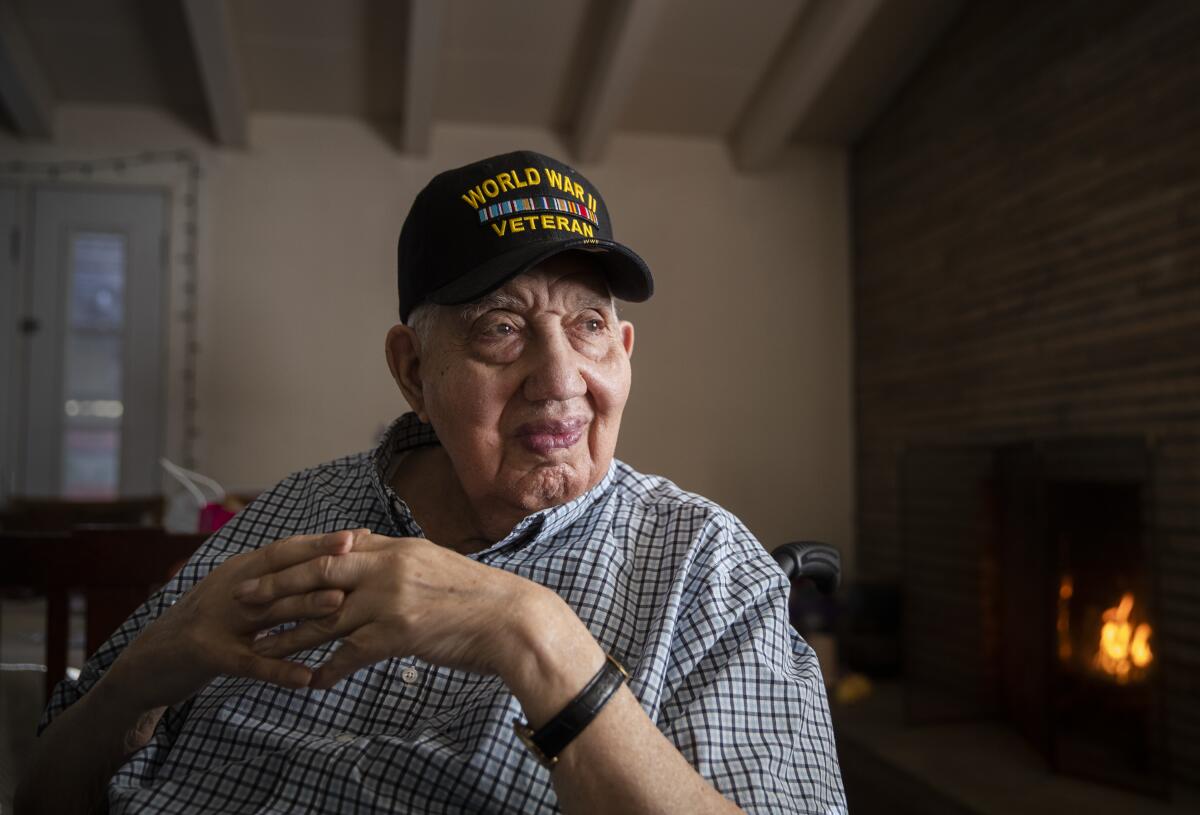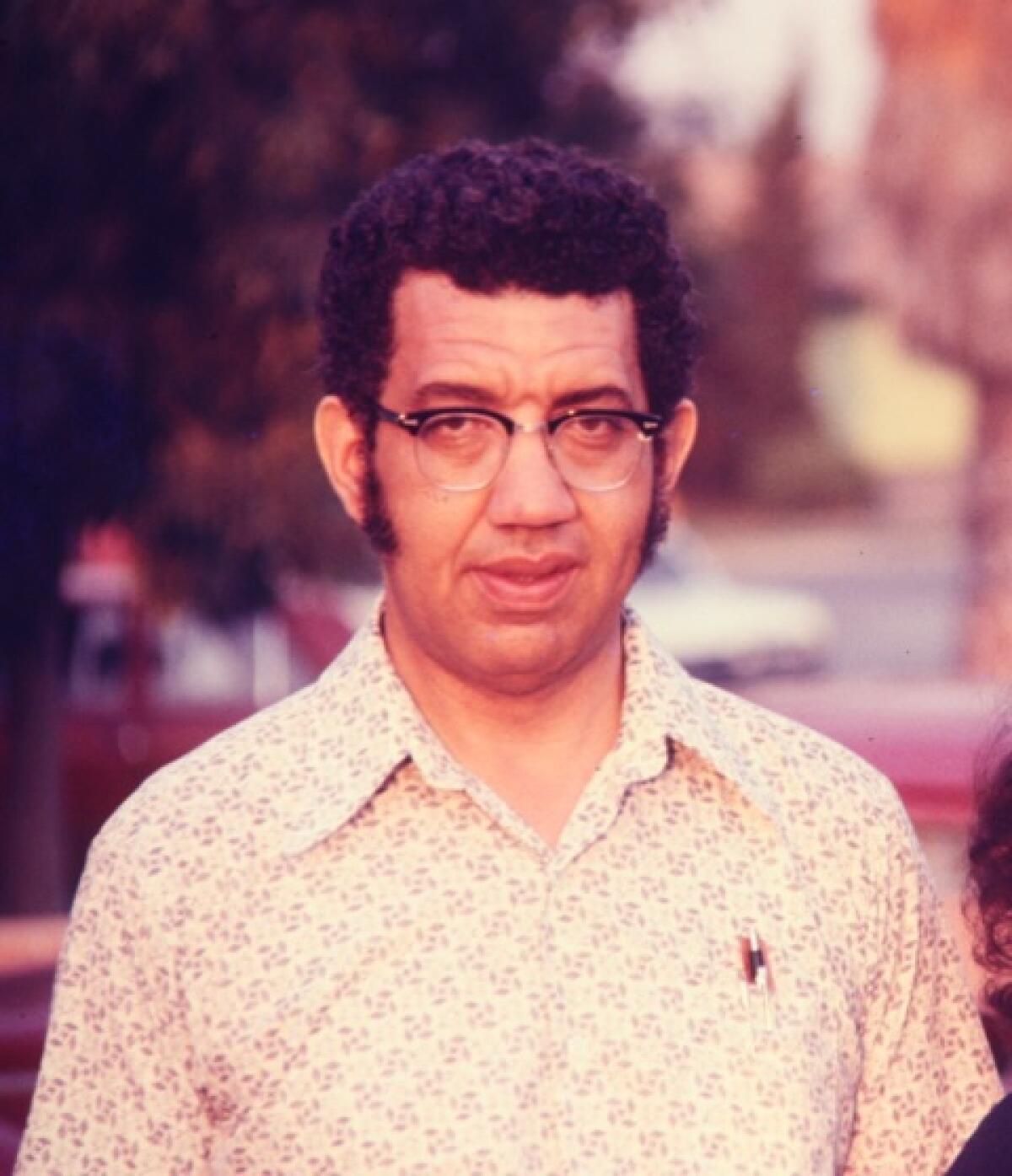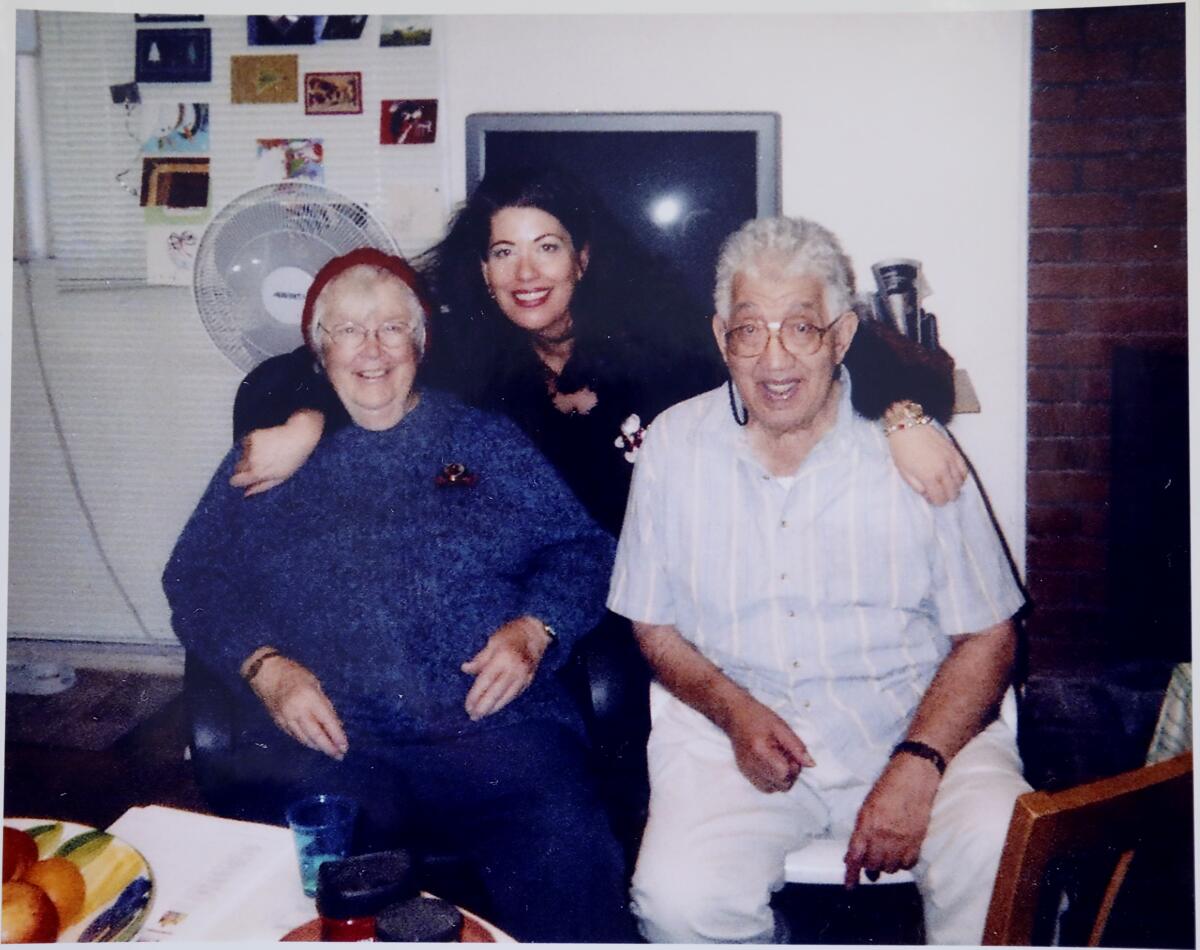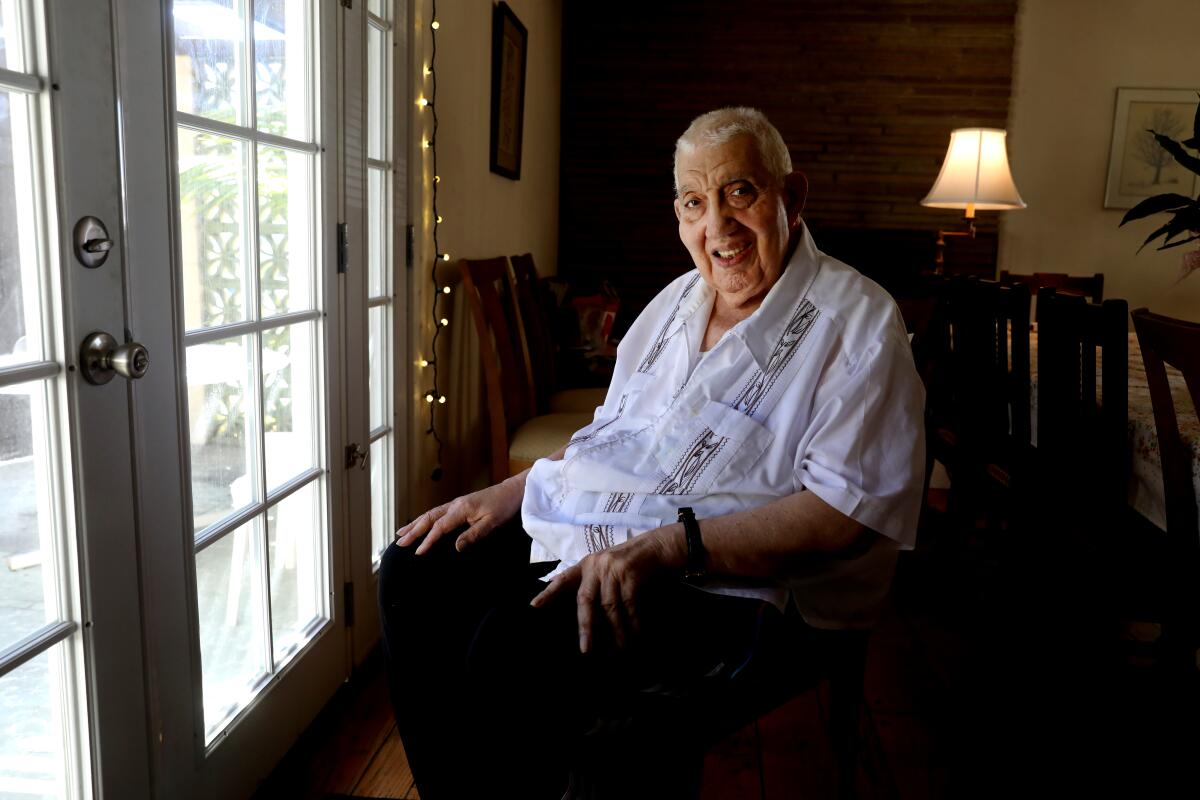Labeled a mutineer during WWII, this 101-year-old Black soldier went on to the stars

- Share via
Bernard Benedict James had news for the caller, who rang the retired aerospace engineer with birthday wishes this week.
“One hundred one is a prime number, as we say in mathematics,” James said with a chuckle. A piece of chocolate cake with mounds of white frosting waited on a nearby table. He paused for a beat and continued, dead serious, “The first 100 years are the hardest.”
The stocky, white-haired centenarian in dress shirt and wheelchair laughed and laughed. On Monday, James turned 101.
There’s a U.S. Army veterans hat near the dining room table in James’ La Mirada home, a sign that he is part of the Greatest Generation, men and women who served during World War II. Although 16 million Americans served in that war, about 240,300 WWII veterans are alive today, according to the Department of Veterans Affairs. An estimated 234 die each day.
James should have been part of the U.S. forces that invaded the beaches of Normandy, France, for D-day in June 1944. Instead he sat in an English prison, convicted of mutiny and insubordination, a Black soldier who dared question a white superior officer.
On this big birthday, he should have been surrounded by his sprawling family — 10 children and four grandchildren — who would celebrate the driving curiosity that led him to work on the Apollo and Mercury space missions.
COVID-19 had different plans. And so did the Army.

Being separated by the pandemic was bad enough. But the James family also was in a race against time, working to get the court-martial expunged from the 101-year-old’s military record.
“He has hoped and tried for the last 70-plus years to have his record set straight and corrected by the U.S. Army,” his son David, a 59-year-old visual effects artist, wrote to the military branch a week before James’ birthday. “We are requesting some urgency on this matter as we would prefer that this exoneration happen while my father is still alive.”
On a Zoom call the day before his birthday, his children, grandchildren and other well-wishers reminisced about his long and eventful life.
“Recently, I was looking up into the skies, and I could see the stars. I realized that I knew every constellation that I was looking at,” said daughter Josefa, 67. “I learned many lessons from you. I learned to navigate in the seas. I learned to shoot a bow and arrow. But I think, if I learned anything from you which wasn’t a lesson you taught, but lived, it’s perseverance. You taught me to persevere.”
James was born Feb. 7, 1921, and spent his formative years in Chicago. His mother’s Creole family came to the United States from Haiti; his father was half Black and a quarter Cherokee. James attended the Illinois Institute of Technology and Wilson Junior College in Chicago and worked as a junior engineer draftsman before he was drafted in 1943. He served as a technician in the Army.
More than 77 years ago, James asked a white commanding officer a question. For that simple act, he and 17 other Black soldiers were court-martialed.
The 641st Ordinance Company was a segregated unit, all Black save for six white officers. The troops were given subpar resources. Food was often lacking. So were adequate clothes. Capt. Herman Hinton, a white commanding officer, often shouted racist remarks at the men and reminded them that he owned their bodies.
“While England was not segregated, the Army was,” James said. “You have to realize that the Army at the time had an unwritten code that no Black person was to be promoted and that no Black person would have anything reported about him that was heroic or anything that made him outstanding.”
It was common for Hinton to refer to Black soldiers as the N-word, James said. The captain added a “Northern” designation when speaking of — and to — men like James; in Hinton’s eyes, James said, it was yet another slur.
In March 1944, Hinton called nearly 100 of his men into a meeting and demanded to know about the men’s morale. No one answered. Hinton asked again. Sgt. George Gayles, a Black soldier, replied: “The men are dissatisfied.”
“Are you dissatisfied?” Hinton asked.
Gayles said yes. He was demoted to private, the lowest rank.
Then James asked if it was fair to demote Gayles just for answering a question. Even today, as he recounts that terrible chapter of his life, James jabs his finger in the air as though he’s addressing someone in the room about a great injustice.
“I had spoken up on behalf of my friend, who was demoted on the spot, which was not according to Army code,” said James, who was also a sergeant. Hinton then asked James to “remove his stripes,” according to court transcripts. Several other men turned theirs in as well in protest. All were Black soldiers.
Two months later, military police officers with submachine guns swarmed the camp and arrested the 18 soldiers. They were court-martialed and convicted after a hasty trial.
“A kangaroo court is what it was,” James recalled.
Back in the United States, a man in a dark coat appeared at the James family doorstep in Chicago and notified them of the court-martial before the Army sent word.
When Genevieve, James’ older sister, came home that day, their mother Ada was in tears.

“They told her, ‘Bernard is in jail and he’s got a sentence of death. Get some legal help,’” Genevieve, 102, told The Times, with help from her husband, Hosea Alexander, on a recent call . The family did not have any other information about James’ fate.
James was first sent to a prison in Shepton Mallet, a centuries-old stone facility constructed when James I ruled England and William Shakespeare was alive.
Prisoners were ordered to sort through the clothes and personal effects of soldiers who had been killed on the battlefield. James came across service members’ dog tags, their names and ranks printed on the pieces of metal. He made small wooden crosses to memorialize the men.
“I was nailing these tags to wooden crosses, and I was very angry,” James said, “because it wasn’t me.”
Not because he wanted to die, but because he wished he was fighting for his country instead of sitting in a prison cell.
James was sent to Rikers Island in New York and, later, to a prison in Terre Haute, Ind.
Genevieve, James’ older sister, wrote to local leaders in Chicago about her brother’s incarceration, and the family received help from a Catholic organization, the Friendship House, which championed civil rights. In October 1945, the Chicago Sun-Times reported on the court-martial. Attorney Leon Despres, who would become one of Chicago’s longest-serving aldermen, represented James and pressed for a Senate investigation.
“Shortly after that, a general’s car showed up at the prison,” James said. “A few other people from Terre Haute were put into the car and we were sent back to duty at Ft. Knox.”
James spent more than a year in prison. He was honorably discharged in 1947; his discharge papers show that his service was docked for the time he was incarcerated.
After leaving the Army, James went back to school, first at the University of Michigan and then at Harvard University. He married Florence, a white woman who was a journalist and later a librarian. She died in 2014 at age 93.
James was in great demand as a mathematician for the aerospace industry and moved his family across the country several times. Eventually, they landed in Southern California, where he worked for NASA’s Jet Propulsion Laboratory.

In the 1980s and ’90s, James wrote to the Army to clear his record but never heard back. In early February, son David did the same.
After The Times inquired about James’ case, Army officials said Tuesday that they will connect James and his family with the Army Review Boards Agency, which is the highest level of administrative review.
“The Army puts a high priority on honoring the service of our veterans and providing appropriate review and correction of records, where there is demonstrated error or injustice,” spokesperson Sgt. 1st Class Anthony Hewitt said in a statement. “There is a process that must be followed, and given his advanced years, we will expedite as best we can, even though we cannot at this time guarantee in advance a final outcome.”
Son Frank, 71, described growing up in the family’s crowded home as “a real tumultuous time.” The youngest child, Isabel, 57, said: “We grew up in a white, middle-class community in La Mirada. There was always going to be some awareness of race present. Over the years, the racism just got more muted.”
Daughter Maria-Elena, 68, become a federal magistrate judge. She encapsulated that feeling best during a recent Zoom call with her family. In 1962, James invited Walter Schirra, a personal friend and the first astronaut to go into space three times, to his children’s La Mirada school.
“At the time, La Mirada was almost all white,” Maria-Elena recalled. “I was sitting there proudly beaming as my father was in front of the auditorium with a model of the rocket ship and a famous astronaut.”
Then a boy in front of her turned around and called her father the N-word. She hit him in the mouth.
“I got sent home for fighting. I got into five fights that day,” Maria-Elena said. “They didn’t appreciate the astronaut, but they did appreciate that my father was Black.”
As he enters his 102nd year, James acknowledges life’s injustices and its joys. He was angry when he was in prison and when he encountered racism throughout his life, he said, but he always tried to follow a simple rule.
“You recognize it and you speak up,” he said. “But then you move on. Life is too short.”
Even when you’re 101.
More to Read
Sign up for Essential California
The most important California stories and recommendations in your inbox every morning.
You may occasionally receive promotional content from the Los Angeles Times.











